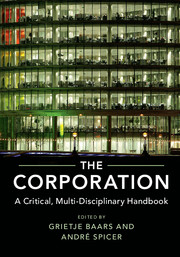Book contents
- Frontmatter
- Contents
- List of Contributors
- Acknowledgements
- Introduction: Why the Corporation?
- PART I DISCIPLINARY OVERVIEWS
- PART II INTERDISCIPLINARY THEMATIC CHAPTERS
- 1 The Evolution of the Corporate Form
- 2 The Multinational Corporate Group
- 3 The Financialization of the Corporation
- 4 Corporate Value Chains
- 5 Corporate Citizenship
- 6 The Corporation and Crime
- 7 The Corporation and Ideology
- 8 Corporation and Communities
- a Articulating and Disarticulating Corporation and Community
- b Communities Inside and Outside the Corporation: Control, Power and Interests
- c Coercion and Corporate Power: Notes on Class Struggle in an Indian City
- 9 Corporations and Resistance
- 10 Alternatives to the Corporation
- Index
- References
c - Coercion and Corporate Power: Notes on Class Struggle in an Indian City
from 8 - Corporation and Communities
Published online by Cambridge University Press: 31 March 2017
- Frontmatter
- Contents
- List of Contributors
- Acknowledgements
- Introduction: Why the Corporation?
- PART I DISCIPLINARY OVERVIEWS
- PART II INTERDISCIPLINARY THEMATIC CHAPTERS
- 1 The Evolution of the Corporate Form
- 2 The Multinational Corporate Group
- 3 The Financialization of the Corporation
- 4 Corporate Value Chains
- 5 Corporate Citizenship
- 6 The Corporation and Crime
- 7 The Corporation and Ideology
- 8 Corporation and Communities
- a Articulating and Disarticulating Corporation and Community
- b Communities Inside and Outside the Corporation: Control, Power and Interests
- c Coercion and Corporate Power: Notes on Class Struggle in an Indian City
- 9 Corporations and Resistance
- 10 Alternatives to the Corporation
- Index
- References
Summary
Introduction
One evening in the summer of 2006, I sat in the back of an auto-rickshaw with a smartly dressed industrial manager named Ashok, who claimed that the iconic Indian corporation that he worked for was run by murderers. Ashok's home town of Jamshedpur in eastern India is the site of the Tata Steel plant, which was built in 1907 by the industrialist Jamshed Tata, after whom the city is named (Fraser, 1919; Pillai, 1923; Bahl, 1995). Today, the Tata corporation also has major global interests in telecommunications and the manufacture of automobiles. As a successful Indian-owned enterprise founded during the colonial era, both the Tata company and the city it administers occupy an important place in the national consciousness. Tata is popularly renowned for its high levels of corporate social responsibility and Jamshedpur is a prosperous industrial city of 1.3 million people, many of whom are descendants of labour migrants that arrived during the first half of the twentieth century (Weiner, 1978: 161). However, the erosion of permanent employment since the 1990s has prompted a radical reconfiguration of the relationship between the corporation and its town, and is the subject of a popular local discourse about elite criminality
This essay considers the political role of the corporation within modern company towns, where the decline of paternalistic employment regimes is associated with an increasingly antagonistic class politics. Based upon ethnographic fieldwork in Jamshedpur, I discuss why workers in one of India's oldest industrial firms believe that the decline of their employment security in the previous two decades is facilitated by cooperative criminality in trade unions, corporations and the state. Drawing upon research conducted among managers and the casualized workforce of Jamshedpur's Tata Motors plant, I argue that urban industrial workers use languages of corruption to speak critically about the processes by which power is distributed in India. By situating popular corruption discourses in Jamshedpur against the operation of local labour politics and business enterprise, I describe how practices of corruption and criminality consolidate class power and the reliance of modern corporations upon those practices. The essay suggests a systemic corruption concept rooted in entrepreneurial negotiations between industrial corporations, political representatives, entrepreneurs and violent enforcers.
- Type
- Chapter
- Information
- The CorporationA Critical, Multi-Disciplinary Handbook, pp. 470 - 478Publisher: Cambridge University PressPrint publication year: 2017



